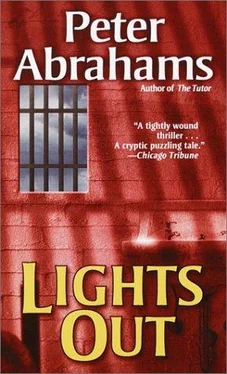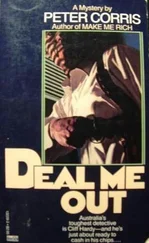Peter Abrahams - Lights Out
Здесь есть возможность читать онлайн «Peter Abrahams - Lights Out» весь текст электронной книги совершенно бесплатно (целиком полную версию без сокращений). В некоторых случаях можно слушать аудио, скачать через торрент в формате fb2 и присутствует краткое содержание. Год выпуска: 2002, ISBN: 2002, Издательство: Fawcett Books, Жанр: Триллер, на английском языке. Описание произведения, (предисловие) а так же отзывы посетителей доступны на портале библиотеки ЛибКат.
- Название:Lights Out
- Автор:
- Издательство:Fawcett Books
- Жанр:
- Год:2002
- ISBN:978-0345445780
- Рейтинг книги:4 / 5. Голосов: 1
-
Избранное:Добавить в избранное
- Отзывы:
-
Ваша оценка:
- 80
- 1
- 2
- 3
- 4
- 5
Lights Out: краткое содержание, описание и аннотация
Предлагаем к чтению аннотацию, описание, краткое содержание или предисловие (зависит от того, что написал сам автор книги «Lights Out»). Если вы не нашли необходимую информацию о книге — напишите в комментариях, мы постараемся отыскать её.
Lights Out — читать онлайн бесплатно полную книгу (весь текст) целиком
Ниже представлен текст книги, разбитый по страницам. Система сохранения места последней прочитанной страницы, позволяет с удобством читать онлайн бесплатно книгу «Lights Out», без необходимости каждый раз заново искать на чём Вы остановились. Поставьте закладку, и сможете в любой момент перейти на страницу, на которой закончили чтение.
Интервал:
Закладка:
Brice looked up from the file. “The investigation was unsuccessful, as you said.”
“You must have discovered something.”
Brice closed the file. “Not a thing.”
“Or eliminated some possibilities. Even that could help.” Eddie dug some bills out of his pocket, counted out fifty dollars, laid it on the desk.
Brice put his hand on the file. “Does your brother know you’re here?”
“No.”
“Plan to see him?”
“No.”
“Know where he is?”
“I don’t know what’s on your mind, Brice. My brother’s dead.”
“You kill him?”
The next thing Eddie knew he was on his feet, standing over the old man.
“Don’t,” said Brice. The tone was harsh and commanding, but that was just the machinery; his eyes were full of fear.
Eddie didn’t touch him. He just picked up the file and took it to the window. Down on the street a cop was tucking a parking ticket under the windshield wiper on Jack’s car. Eddie withdrew the single sheet of paper from the file and read it.
The date was on the top line. Then:
Nye, Jack. Intview #1.
Retainer $250-bank check.
Brother-Eddie (Edw. Nicholas) 5-15 drugs (mj)
Atty.-Glenn Weems, Smith amp; Weems, Ft. L. (who $$$?)
Nds. dvlp. new evdnce re: “JFK”
Bahamas-Saint Amour-Galleon Bch.
DEA-tip? Eddie N.-enemies? J. N. says no.
What about “JFK” as poss. enemy? Doesn’t kn.
“JFK” had mj patch.
But
That was all.
“Where’s the rest of it?” Eddie said, moving in front of the desk.
Brice shook his head.
“But these are just your notes from the first meeting. It doesn’t say what you did or where you went.”
“I didn’t do anything, didn’t go anywhere.”
“Why not?” Eddie ran his eyes over the page again. “And I know he paid you a grand, not two-fifty.”
“Maybe I shouldn’t tell you this.”
“But,” Eddie said. The word that closed the file.
“But your brother’s dead, so maybe you have a right to know.”
“Know what?”
“That I was just following his directions.”
Eddie didn’t understand; all the same, the icy feeling crept across his back and up his neck.
“And two-fifty was all he gave me, I don’t know about any grand.”
“Gave you to do what?” Eddie said.
“Nothing. He said money had been raised and it had to be spent”-Brice gasped for air-“but that you and this JFK were partners-he grew it, you ran it-and you were as guilty as he was. So no confession from him would do you”-another gulp of air-“any good.”
Eddie backed into the chair in front of the desk, almost sat down.
“You’re lying,” he said. His legs didn’t want to hold him up. He made them.
Brice shook his head. “When you mentioned JFK it all came back. I couldn’t forget a thing like that.” Pause for breath. “Only time it happened in thirty-six years.” Brice’s gaze went to the fifty dollars on the desk, then to Eddie. “JFK was lying low in Nassau, according to your brother. I guess your fifty buys that much.” He took another deep breath, but said no more.
Eddie folded the sheet of yellow paper, stuck it in his pocket, picked up the backpack. He remembered Brice’s letter-“our best efforts to locate the individual known as JFK have to this point in time been unsuccessful”-and didn’t think he owed Brice a penny, but he left the money where it was. He didn’t want to touch it.
Rita looked up from her magazine as he went by.
“Can you believe him?” she said. “I tell him, ‘Pa, how can you still smoke after everything that happened to you?’ He just ignores me. He’s such an idiot, sometimes.”
“That’s one of his minor flaws,” Eddie said.
30
Do most lives turn on one crucial event? Eddie didn’t think so. But some did-the Mariner’s for one, and his own for another. Now, after talking to Brice, Eddie knew that he didn’t understand his own crucial event any better than he did the Mariner’s. His imprisonment wasn’t simply the result of bad luck and a twisted chain of circumstance, as he had always thought. That left a lot of questions, questions that Jack could have answered.
The twin-engine Piper followed its shadow southeast across a sea smooth as Jell-O. Blue marked deep water, green the sandy shallows, red-brown the coral heads. A long white cruiser cut across the surface on the same course as the plane, like a tab opening a zipper. The shadow of the plane darkened the boat and left it behind.
“There’s beer in the cooler,” the pilot called from the cockpit.
“No, thanks,” Eddie said.
“Mind grabbing one for me?” Pause. “Little joke.”
The pilot looked back at Eddie to see if he got it. He had watery eyes and a puffy face; perhaps the cooler was for the return trip, solo.
“Good thing,” Eddie said. “I’m with the National Safety Board.”
There was no talk after that. The Bahamas appeared like emeralds on blue velvet, and soon came Saint Amour, as he remembered it, banana shaped and outlined in white. The pilot descended, banked, flew so low that Eddie could see a manta ray gliding below the surface, then skimmed down over pine tops and touched down on the strip, now paved, bounced a few times, and rolled to a stop.
Taking the backpack, Eddie got out. He felt the heat right away. It opened his pores, worked itself deep inside, slowed him down. You on island time now .
He looked around. Except for the pavement on the strip, nothing had changed, not the scrub forest, the still air, the floral smells. The strip was deserted but for a single crab sidestepping down the center. Eddie hoisted the pack on his back, crossed the strip, and started down the dirt road. Behind him, the plane gathered speed, roaring as it rose into the sky, then throbbing, then buzzing, then making no sound at all. A big brown bird rose from the trees, orange legs tucked up against its tail. Eddie could hear the heavy wings beating the air.
In five or ten minutes, he came to the flamboyant tree that marked the path leading to JFK’s marijuana patch. The path was gone, lost in a coiling growth of creeper and bush. But the flamboyant tree seemed much bigger, its red-flowered branches now reaching across the road, dappling the sun. He had a strange thought: This would be the place to bury Jack .
Eddie walked on, and a verse of the poem came to him, as though his mind were a CD player programmed on shuffle.
The many men, so beautiful!
And they all dead did lie:
And a thousand thousand slimy things
Lived on; and so did I.
But Jack, it turned out, hadn’t been beautiful, and he himself didn’t feel slimy. Where were all these beautiful dead people? Louie? The Ozark brothers? Paz’s driver? All dead, none beautiful. Killing might be wrong, but not because of some inherent beauty in the species. Where was it? In Tiffany? Sookray? Paz? El Rojo? No. Not in Gaucho either. Childhood and beauty were not the same; he remembered how he had fallen through the ice in his hockey skates. Then he thought of Karen, how she had kissed him and said, “I’m attracted to you, and I haven’t been attracted to anyone in a long time. Remember that, no matter what happens.” And despite what had happened, despite the fact that she’d been working to bring his brother down, Eddie couldn’t fit her into this new and dismal scheme of things.
The road swung right, toward the sea. He could see patches of it framed by the trees, flashing shapes of blue and gold, like abstract art on the move. He was sweating now; it dripped off his chin the way it had the last time he’d walked this road. The dead pig had weighed much more than $488,220, but he hadn’t been wearing Jack’s winter clothes. He stopped, took off the sweater, rolled up the shirt-sleeves, kept going.
Читать дальшеИнтервал:
Закладка:
Похожие книги на «Lights Out»
Представляем Вашему вниманию похожие книги на «Lights Out» списком для выбора. Мы отобрали схожую по названию и смыслу литературу в надежде предоставить читателям больше вариантов отыскать новые, интересные, ещё непрочитанные произведения.
Обсуждение, отзывы о книге «Lights Out» и просто собственные мнения читателей. Оставьте ваши комментарии, напишите, что Вы думаете о произведении, его смысле или главных героях. Укажите что конкретно понравилось, а что нет, и почему Вы так считаете.












